- Home
- Sustainability
- Environment
- Action on Climate Change
Action on Climate Change
Basic approach
Recognizing that our business activities affect the entire planet and that protecting the global environment is essential for our survival and activity, we actively take the initiative to protect the environment under the Nisshin Seifun Group Environmental Basic Policy, including initiatives to reduce waste and CO2 emissions and to effectively use resources and energy.
We are working to minimize the effects of climate change by reducing the amount of greenhouse gases produced through our business activities, including at the manufacturing stage and during the delivery of products and services. We also recognize that climate change affects the Group’s business, and we are responding proactively so that we can fulfill our social responsibilities to ensure a stable supply of staple foods such as wheat flour and to deliver safe products through each of our businesses.
Disclosure based on TCFD recommendations
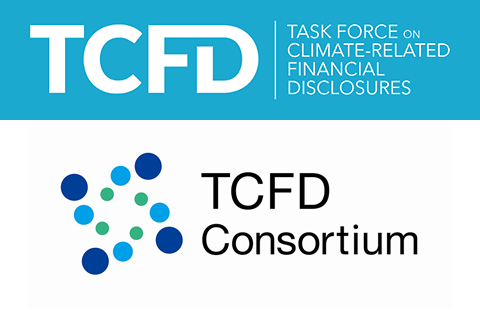
The Nisshin Seifun Group recognizes climate change as a factor that could have a direct and indirect impact across all stages of its supply chains, including the increased risk of natural disasters affecting its operating sites and wheat-growing regions. We conduct scenario analysis on climate-related risks and opportunities for our Group businesses based on the TCFD framework and use the findings as the basis for collective engagement with our stakeholders through disclosure. In August 2021, we expressed our support for the TCFD Recommendations and announced our participation in the TCFD Consortium.
We conducted scenario analyses based on the TCFD recommendations to identify risks and opportunities under the scenarios in which global temperatures rise by 1.5˚C and 4˚C in the period to 2050.
Furthermore, we have identified particular important risks and opportunities andce and examined climate strategy to address them. By reflecting the results of the analysis in our business strategy, we will enhance the continuity of our business and contribute to the realization of a sustainable society.
Disclosure based on TCFD recommendations (1.2MB)
Medium/Long-term Targets
To address global warming, in fiscal 2021 the Nisshin Seifun Group set medium/long-term targets to be achieved by fiscal 2030 and 2050. Out of the six designated greenhouse gases we have set targets for CO2 emission reductions as the highest priority in our Group operations.
Our efforts to mitigate the impacts of climate change and minimize business risks include the reduction of our CO2 emissions through the proactive introduction of energy-saving technologies and the use of renewable energy. We will continue to contribute to the realization of a decarbonized society through these and other approaches.
Targets
Targets for 2050:
- Reduction of CO2 emissions from facilities owned by the Group to zero
- Reduction of CO2 emissions across our supply chains
* We will work toward our targets for 2030 through the same initiatives.
Targets for fiscal 2030: Reduction of CO2 emissions from facilities owned by the Group by 50% compared with the fiscal 2014 level
CO2 emissions volumes and intensity
We are reducing energy consumption on a Group-wide basis by introducing energy-efficient facilities and improving production efficiency. We set targets for each fiscal year based on medium/long-term targets and annual planned production volumes.
The target for fiscal 2023 is to be below 389,000 t-CO2.
In fiscal 2021, the total amount was reduced by 23,000 t-CO2 compared to the previous year.
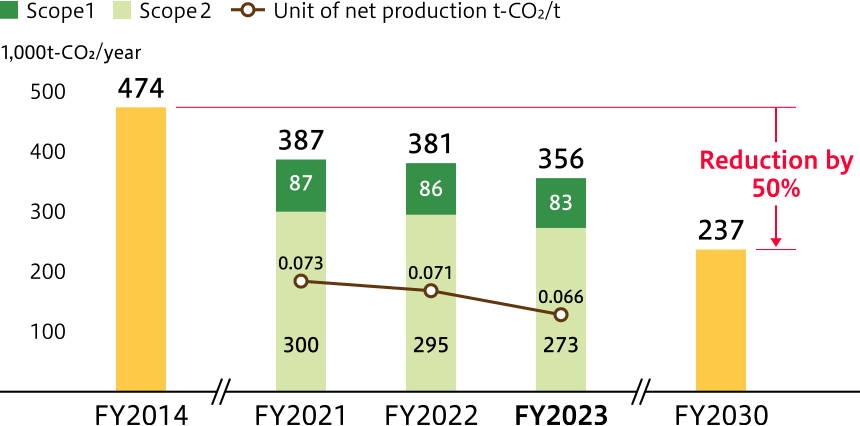
Organizational boundaries
| FY2014 (base year) |
FY2021 | FY2022 | FY2023 | |
|---|---|---|---|---|
| Scope1+Scope2 (1,000t-CO2) | 474 | 387 | 381 | 356 |
| Coverage (%) | 100 | 100 | 100 | 92 |
* The scope of the data does not include the operation sites of Oriental Yeast India Pvt. Ltd., which commenced operations in fiscal 2023, or Kumamoto Flour Milling Co., Ltd., which was added to the consolidation in the same year.
Details of environmental data (6.1MB)
Toward the achievement of carbon neutrality by 2050
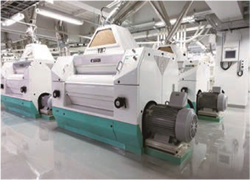
The Nisshin Seifun Group is actively working to reduce CO2 emissions by introducing energy-saving systems and implementing comprehensive efficiency improvement measures. We also accelerate the shift to the use of renewable energy including electricity proucunant from renewable energy sources and expansion of the renewable energy use.
We recognize the need for continual large-scale capital expenditure based on long-term perspectives in order to achieve our Group targets. We have started to draw down a roadmap for the reduction of CO2 emissions by 2030. This roadmap will allow to visualize the timing and scale of capital expenditure and the Group-wide benefits of these investments. We have also introduced internal carbon pricing (ICP) that offers insights for capital expenditure plans of the Group’s climate strategy.
Transition to renewable energy use
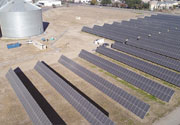
We have introduced a large-scale solar power generation facility at a flour plant operated by Miller Milling Company, LLC in California, an area blessed with abundant sunshine. The Fresno plant will increase the capacity of the solar power generation facility and the plant is enrolled in the ENERGY STAR Challenge for Industry*. This challenge will promote efforts to achieve further energy reduction by 2024.
* A program of the U.S. Environmental Protection Agency (EPA) to promote energy reduction through efficiency and renewable energy sources.
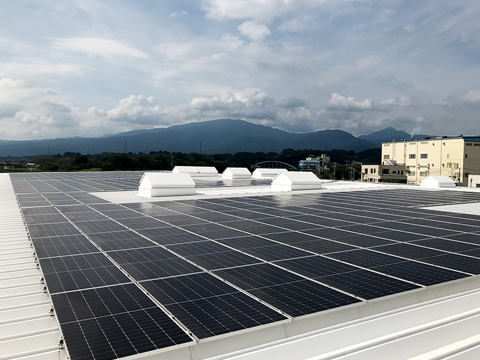
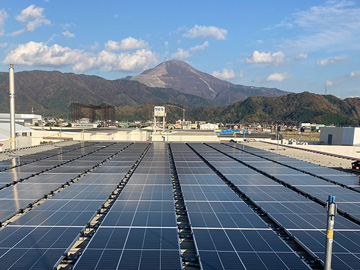
New solar power generation facilities came on line at multiple business sites in Japan and overseas. We installed facilities not only through our own investment, but also through the on-site power purchase agreement (PPA).
100% of the electricity for operation was procured from renewable energy sources using off-site corporate PPAs schme
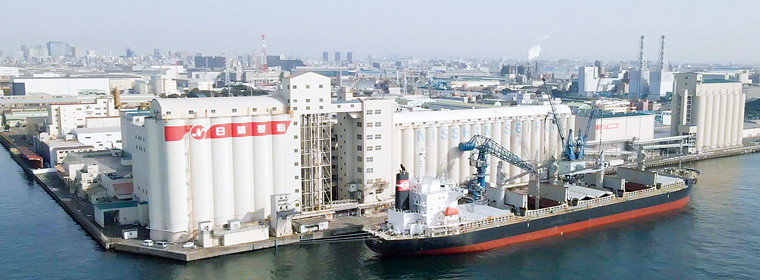
In November 2023, the Nisshin Seifun Tsurumi plant shift 100% of the electricity used for operation to renewable energy by aggregated solar power through off-site corporate PPAs scheme and purchasing non-fossil certificates with tracking in collaboration with electric power retailer. Virtually all of the electricity used at the Tsurumi Plant, the largest flour mill in Japan (which produces approximately one-tenth of the flour consumed in Japan), is covered with renewable energy sources that corresponding approx. 27,000 tons of CO2 emissions reductions per year.
Press releases (Japanese)
Procuring electricity from renewable energy souces
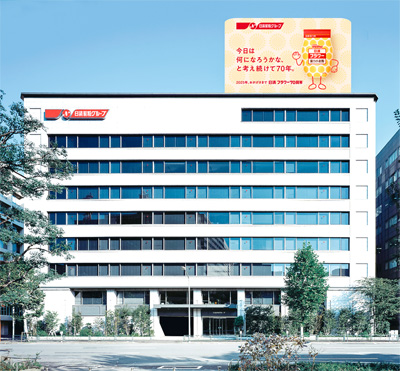
We shifted electric power to solar and biomass sources for 100% of the needs of our Group headquarter buildings in Kanda-Nishiki-cho and Koami-cho, Tokyo. We are moving forward proactively toward the achievement of net zero CO2 emissions resulting from the use of energy at our business sites.
NBC Meshtec procure renewable energy option for electricity use of the Yamanashi Tsuru Factory. The factory, which emits approximately 2,900 tons of CO2 per year*, achieved net zero CO2 emissions.
* Calculated based on electricity consumption in FY2021
Press releases (Japanese)
Energy saving through lighting
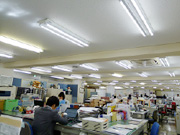
We are actively implementing measures to reduce electricity consumption at each of our business sites. For example, we are installing lighting equipped with LED and motion sensors and paying close attention to how we use air conditioning to adjust temperatures in order to reduce CO2 emissions as much as possible.
Reducing CO2 emissions related to logistics
We monitor the environmental impact of transporting the Group’s products and work to reduce this impact through measures such as making packaging and containers lighter, improving truck carrying efficiency and logistics services, and making joint deliveries with other companies.
Collaborating with six other Japanese food product manufacturers to launch F-LINE®, a logistics platform for food companies
In April 2016, we collaborated with five other companies to make our first joint deliveries (non-frozen products) in the Hokkaido region. We are improving transportation efficiency through the joint use of distribution centers and delivery vehicles with the aim of reducing CO2 emissions. Our goal going forward is to continue making our logistics systems even more sustainable.
Press releases (Japanese)
Managing CFCs appropriately and reducing emissions
CFC gases that are used as refrigerants in air conditioners, refrigerators, and freezers damage the ozone layer when released into the atmosphere and create a greenhouse effect that is several thousand times more potent than that of CO2. Since fiscal 2016, businesses in Japan are obligated to carry out regular inspections of these types of equipment and report leakage volumes under the Act on Rational Use and Appropriate Management of Fluorocarbons (Revised Fluorocarbon Act).
All Group business sites in Japan and overseas ensure proper management of equipment that uses these CFCs, through measures such as compiling inventories of such equipment, carrying out regular inspections, and upgrading or disposing of it when necessary. We have voluntarily set standards for carrying out this management with the aim of preventing CFC leaks.
We report any leaks involving CFC gas emissions equivalent to at least 1,000t of CO2, in accordance with the Revised Fluorocarbon Act.
Also, we are working toward switching refrigerants and upgrading equipment with CFC-free alternatives, and we are systematically investing capital to replace equipment that uses HCFCs as a refrigerant with the target of fully phasing it out by 2030.
Adapting to climate change
Global warming is posing a threat of increased damage from natural disasters including water damage from rising sea levels, tsunamis, floods, and concentrated heavy rainfall. We recognize the impact that climate change can have on the Group’s business, and we are taking various steps in response. We have the largest network of flour mills and silos in Japan which means it is our social responsibility to provide society with an uninterrupted, stable supply of foods. We work to minimize the impact of disasters on people’s livelihoods by carrying out measures to ensure food supply is maintained, such as improving management structures and operating facilities.
The Paris Agreement and UN Sustainable Development Goals (SDGs) agreed in 2015 are accelerating a shift in society toward sustainable development. In order to remain as a Group that is truly essential to society, we need to adapt to the various risks posed by climate change more than ever before. We acknowledge that such action takes time, so we are aiming to integrate environmental management more firmly into our business with the long-term focuses of 2030 and 2050.
Minimizing impact on business
We are implementing measures to minimize the impact on consumers in the event of a disaster by ensuring a steady supply of foods.
In the event that changes in rainfall patterns due to unusual climate conditions cause concerns of potential droughts, we will assess the state of water resources at manufacturing sites and potential impact on supply structures, and take steps to minimize the impact on production.
We are also implementing measures focused on preventing water damage caused by disasters at business sites across Japan. We have used the results of hazard map analysis to predict the impact of floods and tsunamis on 25 business sites and we are ensuring that these sites are ready to act in an emergency by creating countermeasure manuals, procedure sheets, and carrying out training drills.
- Preparing for emergencies
-
- Analyzing the impact of natural disasters using hazard maps
- Creating countermeasure manuals and procedure sheets for times of disaster
- Carrying out regular training in preparation for emergency situations
- Positioning key manufacturing equipment on the second floor of buildings or higher
- Installing generators in preparation for power outages during disasters
At our Tsurumi Plant, which is Japan’s largest flour mill, we are minimizing a potential collapse of the wharf or other damage from berthing ships transporting flour through steps such as reinforcing the foundations of the wharf and its surrounding area. We have also formulated a business continuity plan to fulfill the Group’s social responsibility of maintaining food supplies that are essential for society. While our efforts have been primarily focused on responding to tsunamis resulting from earthquakes, we also recognize that they will prove useful in tackling climate change-related risk to ensure stable food supplies.
Introducing heat reflective materials for buildings

Nisshin Seifun Group Inc.’s Kamifukuoka Laboratories
One of the effects of global warming is an increase in the number of extremely hot days during summer. By introducing heat reflecting materials on the roofs and exteriors of the buildings, we are realizing the effective use of air conditioning facilities.
Survey of literature relating to the impact of climate change on wheat
There are concerns that rising global temperatures, extreme weather events, and changes in rainfall patterns will affect the growth of crops, increase damage caused by pests and diseases, and reduce production volume and quality.
The Nisshin Flour Milling Group will continue to research the impact of climate change on wheat growth and flour quality.
Survey of literature relating to the impact of climate change on wheat (539KB)
- Environmental Management
- Medium/Long-term Targets for Environmental Issues
- Material Balance
- Action on Climate Change
- Waste Reduction and Resource Recycling
- Water Resource Initiatives
- Consideration for Biodiversity
- Environmentally Friendly Products and Services
- Local Environmental Conservation Activities







